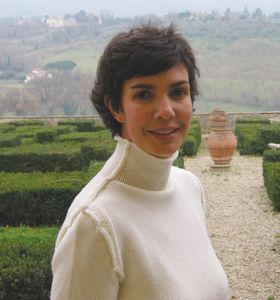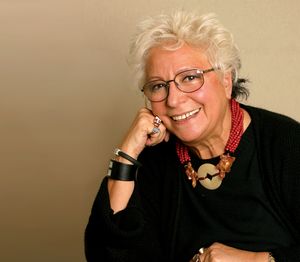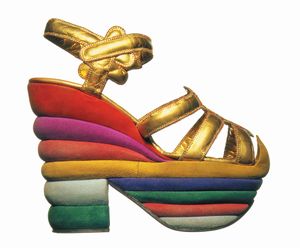Giovanna Ferrer was once the director of International Public Relations for Salvatore Ferragamo, drove a sports car, and lived in the centre of Florence. Since then she moved on to a board of director’s seat for the Audrey Hepburn Children’s Fund, married Sean Ferrer (Audrey’s son), became the mother of two sons, and now drives a family-sized car to her house in the Tuscan countryside.

You continue to do amazing humanitarian work with the Audrey Hepburn’s Children’s Fund. What are some projects you and the fund are working on right now?
Currently, I am working on finding sponsors and locations for the Timeless Audrey exhibit. It’s an exhibit that serves as a tribute to Audrey’s remarkable life and will travel the world in 2007. So, I’m helping with those preparations. In 1999, the exhibit opened at the Museo di Salvatore Ferragamo, under the direction of Stefania Ricci and then traveled to over 10 cities in Japan, where it was seen by over one million visitors. Japan is a major supporter of Audrey Hepburn; she is possibly more famous there now than she was ten years ago. It’s amazing. Ticket sales benefit the Audrey Hepburn Children’s Fund’s joint venture with the UNICEF’s All Children in School educational initiative.
How did the All Children in School program begin?
It started as big project sponsored by UNICEF and its aim is to bring 120 million children worldwide back to school. The children in question have no access to basic education and 80 million of them are girls. It takes billions of dollars to do this, as you can imagine. We are just a little part of the project, but the Audrey Hepburn Children’s Fund and UNICEF are both committed to using their resources for these children. Again, all profits from the Timeless Audrey exhibit will go to the All Children in School program. The same is true for all the projects we have planned for the next eight years. We obviously have a big commitment with UNICEF because Audrey was a UNICEF ambassador.
What are some other activities the fund is involved in?
We are not a big organization, so we really try to use Audrey’s image to create awareness and promote projects that we really like and believe in. We always work with other organizations to work on setting and accomplishing concrete goals—we just take it step by step.
As you can imagine, many companies want to use Audrey’s image to promote their products. This licensing, of course, is the property of my husband, Sean, and his brother. So what Sean does, 100 percent of the time, is oversee that licensing revenues are given to the fund. Right now, for example, The Gap is using Audrey’s image to launch the ‘Audrey Skinny Pants’. A percentage from the sale of these pants is turned over to the fund.
Right now, the fund is dedicating a lot of energy to saving and healing abused children. We started and support three children’s homes in the United States that care for neglected children and victims of child abuse. Sean chose this area is because his mother could not accept the abuse of an innocent child. Watching any dying child is an awful thing, but it’s somehow more natural, or expected, I guess, to see a child die in the arms of his mother in Africa due to famine, rather than seeing a child die from violence and abuse. Both are truly hard images to accept and understand. But abuse was absolutely unacceptable in Audrey’s eyes.
From your humanitarian work, you are leaving a lit torch for the next generation. What inspires you? And what advice can you offer people who want to help?
My children inspire me. So do children in general. So many women in this community come to me and say ‘you know, I would really like to do something humanitarian, how can I start?’ and they are always trying to figure it out. I always tell them ‘the first thing we can do is to take really good care of our children and we have a humungous job to do. And if we have time after that, then we can do something else’. Parents are the ones who will create a new generation of people. It all starts from the micro-cosmos of the family and continues in schools.
I truly believe that parents have to start educating their children about peace and suffering. People forget how important that is. They say ‘I want to do something to make the world a better place’. That’s true, no doubt, but you have to start with your own family. Don’t take time away from the children. When they are older you can, but now, concentrate on them, bring them around, take them on trips, expose them to the world and make them aware. That’s my message. It’s so important. They are children; they are our future. I am very hopeful about this new generation and I can see that there are seeds already blooming all over the world, but we have such a long way to go. It’s very important.







